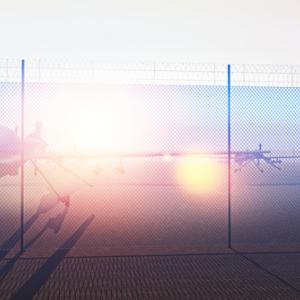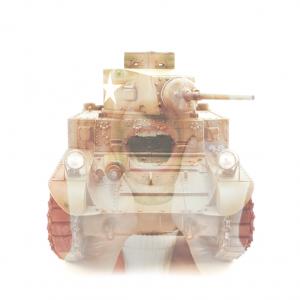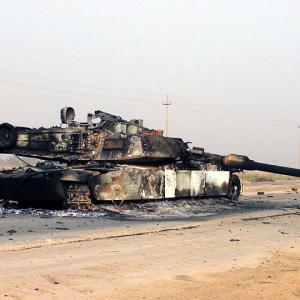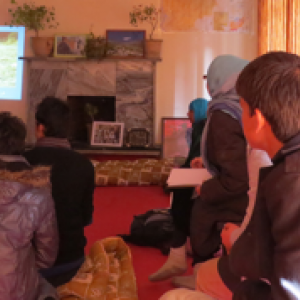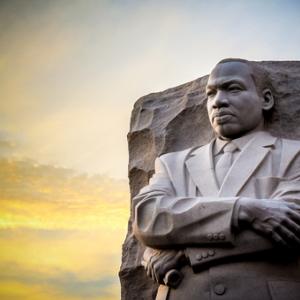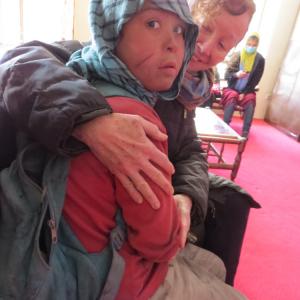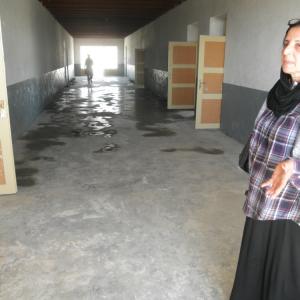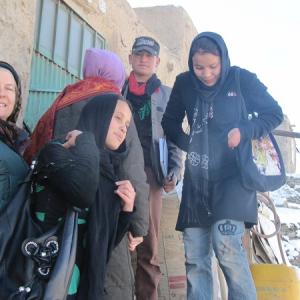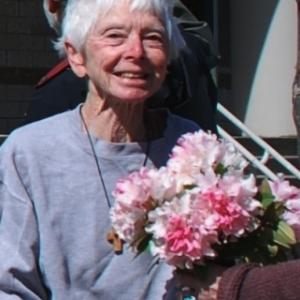Kathy Kelly (kathy@vcnv.org) co-coordinates Voices for Creative Nonviolence (www.vcnv.org)
Posts By This Author
Harassing the Drones
“The final perversion is the reversal of who is the real victim here: the commander of a military base whose drones kill innocent people halfway around the world, or those innocent people themselves who are the real ones in need of protection from the terror of U.S. drone attacks?”
Bowe Bergdahl and the Voice of War
During my recent visit to Gangjeong, on Jeju Island, South Korea, where a protest community has struggled for years to block construction of a U.S. military base, conversations over delicious meals in the community kitchen were a delightful daily event. At lunchtime on my first day there I met Emily and Dongwon, a young and recently married couple, both protesters, who had met each other in Gangjeong. Emily recalled that when her parents finally travelled from Taiwan to meet her partner, they had to visit him in prison.
Dongwon, who is from a rural area of South Korea, had visited Gangjeong and gotten to know the small protest community living on the Gureombi Rock. Drawn by their tenacity and commitment, he had decided to join them. When a barge crane was dredging the sea in front of Gureombi Rock, Dongwon had climbed up to its tip and declined to come down. On February 18, 2013, a judge sentenced him to one year in prison for the nonviolent action.
A Pivot on the Peace Island
Jeju Island, South Korea — For the past two weeks, I’ve been in the Republic of Korea (ROK), as a guest of peace activists living in Gangjeong Village on ROK’s Jeju Island. Gangjeong is one of the ROK’s smallest villages, yet activists here, in their struggle against the construction of a massive naval base, have inspired people around the world.
Since 2007, activists have risked arrests, imprisonment, heavy fines, and wildly excessive use of police force to resist the desecration caused as mega-corporations like Samsung and Daelim build a base to accommodate U.S. nuclear-powered aircraft carriers and submarines for their missions throughout Asia. The base fits the regional needs of the U.S. for a maritime military outpost that would enable it to continue developing its Asia Pivot strategy, gradually building towards and in the process provoking superpower conflict with China.
“We don’t need this base,” says Bishop Kang, a Catholic prelate who vigorously supports the opposition.
Reclaiming Resources from War, Railguns, and Grenades
In early April, the U.S. Navy unveiled its Mach 7 Magnetic Mangler, “a railgun straight out of Star Trek that can take out targets at 100 miles with a projectile flying at nearly 7,000 feet per second.” So far, the U.S. military has spent $240 million developing the railgun over a period of 10 years. CBS News reports that the railgun won’t go to sea until 2016, but one article, published in The Gazette, suggests that the U.S. military may have decided to show off the Magnetic Mangler in order to send a message to the Russian government.
In advance of the University of Wisconsin's recent “Resources for Peace” conference, a professor friend asked participants to consider whether the increasing competition for depleted global resources, for goods to meet essential human needs, would tend inevitably to make people less humane. She was thinking particularly about what she termed “the shrinking humanism” seen in dystopian novels and films that portray cruelty and violence among people who fear for their survival.
Salt and Terror in Afghanistan
Two weeks ago in a room in Kabul, Afghanistan, I joined several dozen people — working seamstresses, some college students, socially engaged teenagers, and a few visiting internationals like myself — to discuss world hunger. Our emphasis was not exclusively their own country’s worsening hunger problems. Rather, tmhe Afghan Peace Volunteers, in whose home we were meeting, draw strength from looking beyond their own very real struggles.
With us was Hakim, a medical doctor who spent six years working as a public health specialist in the central highlands of Afghanistan and, prior to that, among refugees in Quetta, Pakistan. He helped us understand conditions that lead to food shortages and taught us about diseases, such as kwashiorkor and marasmus, which are caused by insufficient protein or general malnutrition.
We looked at U.N. figures about hunger in Afghanistan, which show malnutrition rates rising by 50 percent or more compared with 2012. The malnutrition ward at Helmand Province’s Bost Hospital has been admitting 200 children a month for severe, acute malnutrition — four times more than in January 2012.
A recent New York Times article about the worsening hunger crisis described an encounter with a mother and child in an Afghan hospital: “In another bed is Fatima, less than a year old, who is so severely malnourished that her heart is failing, and the doctors expect that she will soon die unless her father is able to find money to take her to Kabul for surgery. The girl’s face bears a perpetual look of utter terror, and she rarely stops crying.”
Photos of Fatima and other children in the ward accompanied the article. In our room in Kabul, Hakim projected the photos on the wall. They were painful to see and so were the nods of comprehension from Afghans all too familiar with the agonies of poverty in a time of war.
For Whom the Bell Tolls
Week after bloody week, the chart of killings lengthens. And in Afghanistan, while war rages, a million children are estimated to suffer from acute malnourishment as the country faces a worsening hunger crisis.
Around this Martin Luther King, Jr. Day, we can and should remember the dream Dr. King announced before the Lincoln Memorial, the dream he did so much to accomplish, remembering his call (as the King Center asks) for nonviolent solutions to desperate concerns of discrimination and inequality within the U.S. But we shouldn't let ourselves forget the full extent of Dr. King's vision, the urgent tasks he urgently set us to fulfill on his behalf, so many of them left unfinished nearly 46 years after he was taken from us.
In Kabul, Locked in Winter
The fire in the Chaman e Babrak camp in Kabul, Afghanistan, began in Nadiai’s home shortly after noon. She had rushed her son, who had a severe chest infection, to the hospital. She did not know that a gas bottle was leaking; when the gas reached a wood-burning stove, flames engulfed her mud hut and extended to adjacent homes, swiftly rendering nine extended families homeless and destitute in the midst of already astounding poverty. By the time seven fire trucks had arrived in response to the fire at the refugee camp, the houses had burned to the ground.
No one was killed. When I visited the camp, three days after the disaster, that was a common refrain of relief. Nadiai’s home was on the edge of the camp, close to the entrance road. Had the fire broken out in the middle of the camp, or at night when the homes were filled with sleeping people, the disaster could have been far worse.
Even so, Zakia, age 54, who also lives in the camp, said this is the worst catastrophe she has seen in her life, and already their situation was desperate.
Afghan Street Children Beg for Change
Kabul, Afghanistan, is “home” to hundreds of thousands of children who have no home. Many of them live in squalid refugee camps with families that have been displaced by violence and war. Bereft of any income in a city already burdened by high rates of unemployment, families struggle to survive without adequate shelter, clothing, food, or fuel. Winter is especially hard for refugee families. Survival sometimes means sending their children to work on the streets, as vendors, where they often become vulnerable to well-organized gangs that lure them into drug and other criminal rings.
Last year, the Afghan Peace Volunteers (APV), young Afghans who host me and other internationals when we visit Kabul, began a program to help street children enroll in schools. The volunteers befriend small groups of children, get to know the children’s families and circumstances, and then reach agreements with the families that if the children are allowed to attend school and reduce their working hours on the streets, the APVs will compensate the families, supplying them with oil and rice. Next, the APVs buy warm clothes for each child and invite them to attend regular classes at the APV home to learn the alphabet and math.
Yesterday, Abdulhai and Hakim met a young boy, Safar, age 13, who was working as a boot polisher on a street near the APV home. Abdulhai asked to shake Safar’s hand, but the child refused. Understandably, Safar may have feared Abdulhai. But when Abdulhai and Hakim told Safar there were foreigners at the APV office who were keen to help, he followed them into our yard.
Advice From an Afghan Mother and Activist: 'Resist These Dark Times'
When she was 24 years old, in 1979, Fahima Vorgetts left Afghanistan. By reputation, she had been outspoken, even rebellious, in her opposition to injustice and oppression; and family and friends, concerned for her safety, had urged her to go abroad. Twenty-three years later, returning for the first time to her homeland, she barely recognized war-torn streets in urban areas where she had once lived. She saw and felt the anguish of villagers who couldn’t feed or shelter their families, and no less able to accept such unjust suffering than she’d been half her life before, Fahima decided to make it her task to help alleviate the abysmal conditions faced by ordinary Afghans living at or below the poverty line — by helping to build independent women’s enterprises wherever she could.
War Without End
Ten years ago, in March of 2003, Iraqis braced themselves for the anticipated “Shock and Awe” attacks that the U.S. was planning to launch against them. The media buildup for the attack assured Iraqis that barbarous assaults were looming. I was living in Baghdad at the time, along with other Voices in the Wilderness activists determined to remain in Iraq, come what may. We didn’t want U.S.-led military and economic war to sever bonds that had grown between ourselves and Iraqis who had befriended us over the past seven years. Since 1996, we had traveled to Iraq numerous times, carrying medicines for children and families in open violation of the economic sanctions that directly targeted the most vulnerable people in Iraqi society — the poor, the elderly, and the children.
I still feel haunted by children and their heartbroken mothers and fathers whom we met in Iraqi hospitals.
“I think I understand,” murmured my friend Martin Thomas, a nurse from the U.K., as he sat in a pediatric ward in a Baghdad hospital in 1997, trying to comprehend the horrifying reality. “It’s a death row for infants.”
In Kabul, Widows and Orphans Move Up
Kabul —Yesterday, four young Afghan Peace Volunteer members, Zainab, Umalbanin, Abdulhai, and Ali, guided Martha and me along narrow, primitive roads and crumbling stairs, ascending a mountain slope on the outskirts of Kabul. The icy, rutted roads twisted and turned. I asked if we could pause as my heart was hammering and I needed to catch my breath. Looking down, we saw a breathtaking view of Kabul. Above us, women in bright clothing were navigating the treacherous roads with heavy water containers on their heads or shoulders. I marveled at their strength and tenacity. “Yes, they make this trip every morning,” Umalbanin said, as she helped me regain my balance after I had slipped on the ice.
About 10 minutes later, we arrived at the home of Khoreb, a widow who helped us realize why so many widows and orphans live in the highest ranges of the mountain. Landlords rent one-room homes at the cheapest rates when they are at this isolating height; many of the homes are poorly constructed and have no pipes for running water. This means the occupants, most often women, must fetch water from the bottom of the hill each and every morning. A year ago, piped water began to reach some of the homes, but that only meant the landlords charged higher rent, so women had to move higher up the mountain for housing they can afford. It only made their daily water-carrying longer and more arduous.
Farzana, ‘2 Million Friends’ and a Ceasefire in Afghanistan
“Stop fighting,” suggests Farzana, a brave 22-year-old Afghan stage actress.
Significantly, her statement is in sharp contrast to what seems to be the democratic world’s unquestioned modus operandi of today, exemplified by U.S. Secretary of State Hillary Clinton’s pet-phrase for Afghanistan, ‘Fight, talk and build.’
What Farzana and the Afghan Peace Volunteers are sensibly suggesting is a ceasefire.
A ceasefire — like the one called for in Kofi Annan’s Six Point Peace Plan for Syria that Farzana and the Afghan Peace Volunteers also supported — is a first step towards ending the equally sectarian war and incendiary global politicking in Afghanistan.
It is crucially needed to stop the color-code chaos of ‘green-on-blue’ attacks in which 45 coalition security forces, mainly Americans, have been killed by "allies," Afghan security forces, or insurgents posing as soldiers or police.
It is what is needed to end the four Afghan decades of using mutual killing as a method of conflict resolution. The U.N. is uniquely well-positioned to do this, empowered by their original Charter to "remove the scourge of war from future generations."
Parting with Sister Anne Montgomery
Anne Montgomery died this week. I remember her words to me and to our young Iraqi friend Eva, sitting in the Al Monzer hotel in Amman, Jordan. This was in 2006, and she’d waited three weeks for a visa to enter Iraq as a peace witness. Anne had crossed into zones of conflict more times than any other activist I’d known. During these weeks with us, she’d been meeting and working with Iraqi refugees, many of them undocumented and struggling to eke out a living in Jordan.
Now the wait was over. The visas were not forthcoming, and Anne had decided she was needed most in the Palestinian West Bank city of Hebron, where the Christian Peacemaker Team — at that point, she had been a “CPT-er” for 11 years — was particularly short staffed and had requested a month of her time. She was going to attempt the crossing from Jordan into Israel by taxi, since Israel could very well have refused her entry, and we were to save a bed for her. But for the moment, we treasured the chance to learn from her in case this was a parting.
It was, and a greater parting has now come, so I take comfort in her words, and rededicate myself to taking direction from them.
